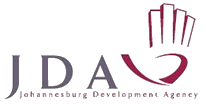JOHANNESBURG has confronted its challenges head-on and has overcome a significant number of them in the 2010/11 financial year, according to the annual report released by the City manager, Trevor Fowler, at the Joburg Theatre Complex on 26 January.
Fowler was accompanied by the portfolio head of finance, Geoffrey Makhubo, and the chief operating officer, Gerald Dumas, in releasing the report before it was tabled to the City council. “The document reflects the performance of the City as a whole,” said Makhubo. “It is important to note when reading the report that the City has moved forward and made significant progress; there is no doubt that we are on an upward curve,” he commented.
It sets out details of the activities and performance of the City measured against the targets and objectives that are defined in Joburg’s five-year Integrated Development Plan (IDP).
The 2010/11 financial year represents the final year of the previous mayoral year and the beginning of the new political term that came into effect after the local government elections in May 2011. “[It] was an era characterised by the introduction of important capital and infrastructure projects such as the Rea Vaya Bus Rapid Transit system and the various initiatives associated with the City’s hosting of the 2010 Soccer World Cup,” Fowler explained.
It was also a period that boasted accelerated delivery of services and infrastructure, most particularly in areas such as Soweto that had been neglected in previous decades.
Initiatives included the social and economic revival of Soweto, as well as greening and regeneration projects. A result of the success of these programmes, was that “Soweto is no longer a place where just the residents go”, said Fowler.
Joburg 2040
Included in the 2010/11 financial year was the current administration’s efforts to build on the foundations of the previous one; the most prominent of these efforts was the launch of the Growth and Development Strategy (GDS), Joburg 2040, in October 2011. It was introduced as a way of dealing with a rapidly changing urban environment with increasing demands on infrastructure, resources and services by charting a long-term vision for the City.
A number of targets were met and even exceeded, making the annual report a triumph for the City. For instance, Rea Vaya reached an average of 30 000 passengers per day against a target of 20 000; in the third quarter of the year, monthly passenger numbers peaked at one million.
“Through the Extended Public Works Programme (EPWP), the City has created over 60 000 job opportunities against the targeted 25 000,” Fowler added. “These were achieved mainly through the implementation of infrastructure, social and environmental EPWP projects.”
Joburg was also ranked as the most productive metropolitan area in a national survey, and the City spent more per head on basic services, capital projects and business infrastructure than any other in the country.
It was racing ahead in terms of becoming a smart city, too; over 300 kilometres of infrastructure had been laid out for the Johannesburg Broadband Network, outrunning the annual target of 200 kilometres. “This network will significantly improve the quality and speed of access to ecommerce, the internet and electronic communication to both business and residents,” he explained.
In terms of access to services, nine out of 10 Joburg residents now received water for household and drinking purposes and citywide coverage had now reached 97 percent for water and 91 percent for sanitation; waste collection in formal areas reached a 99 percent completion rate and the cleanliness level in the inner city was kept within targeted standards.
“At the conclusion of the financial year, we have assisted more than 676 400 residents to access various benefits, services and grants offered by government departments,” he said.
Billing
Of course, even with the numerous successes, there were still challenges and areas where the City fell below its targets. Although revenue collection for the 2010/11 financial year was R19,028-billion, slightly over the R19-billion target, the collection ratio of 88 percent fell short of the 92 percent target.
And the biggest challenge of all for the City was the billings crisis, followed by issues raised by the auditor-general concerning its financial statements. To tackle the billings crisis, a roadmap for revenue and billing enhancement was introduced by Makhubo in November 2011. “[It has] a strong customer-centric approach to improve the quality of residents’ engagement with the City,” Fowler said.
“I am confident that the roadmap will enable us to increase the accuracy and integrity of our billing data, which will in turn be reflected in the quality of the City’s financial reporting.”
Regarding the auditor-general’s concerns, Joburg was committed to returning the City to a “clean audit” status. “The new City administration has taken proactive steps to strengthen internal control mechanisms, enhance revenue management and improve the consistency of data and records,” he added.
There were several interventions already in place to deal with these issues: a more customer-centric approach to billing and revenue issues; a comprehensive turnaround plan for the improvement of the revenue system with clearly defined timeframes and deliverables; and a strengthened oversight system and responsibility at senior management level.
Dumas was confident that these interventions would resolve the billing concerns. “By the end of June 2012, all billings crisis issues will be resolved.”
Overall, the annual report indicated significant growth for the City and provided a firm foundation on which to build going into the future. “[It] reflects the ongoing commitment of the City to improve the quality of life of residents through proactive delivery and the creation of an urban environment that is resilient, sustainable and liveable,” Fowler said.

